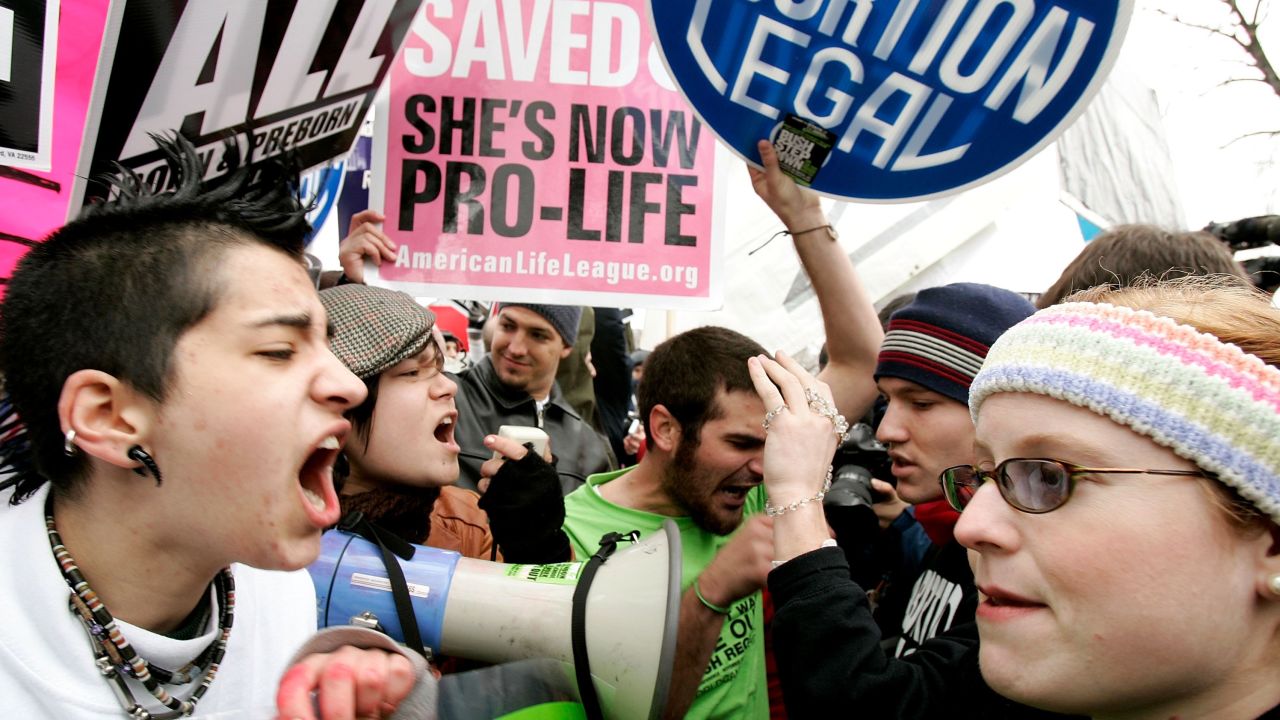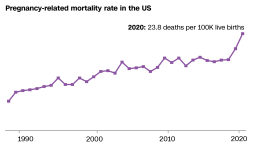Editor’s Note: Peniel E. Joseph is the Barbara Jordan Chair in ethics and political values and the founding director of the Center for the Study of Race and Democracy at the LBJ School of Public Affairs at the University of Texas at Austin, where he is also a professor of history. He is the author of the forthcoming book “The Third Reconstruction: America’s Struggle for Racial Justice in the Twenty-First Century,” in addition to “Stokely: A Life” and “The Sword and the Shield: The Revolutionary Lives of Malcolm X and Martin Luther King Jr.” The views expressed here are his own. View more opinion articles on CNN.
The Supreme Court’s likely evisceration of Roe v. Wade is more than an assault on women. It will be a further perpetuation of racial injustice in America that has a long history.

The leaked opinion draft, authored by conservative justice Samuel Alito, overturns the landmark 1973 ruling as well as the 1992 Planned Parenthood v. Casey decision that placed stricter rules on abortion rights, but upheld the constitutionality of Roe. The draft, in the strength of its language, also illustrates the court’s ideological turn – despite conservative justices having promised moderate senators (most notably Maine’s Susan Collins) during their confirmation hearings that Roe was settled law.
The reality is this: The decision is a potential key step in instituting a national abortion ban. According to the Guttmacher Institute, a research group that supports abortion rights, at least 26 states are certain or likely to ban abortion without Roe in place.
In Texas where I live, the situation is already particularly draconian, with new restrictions passed last year forcing many women out of state and complicating care for women who miscarry.
For Black women living in the South, the birthplace of racial slavery and its afterlife that produced health disparities and racist practices such as forced sterilization, the effects of a post-Roe America promise to be particularly acute.
Historically, Black women have lacked access to humane and decent health care. This continues in the present, where even upper-middle-class Black women suffer worse maternal health outcomes than their White economic peers. Why does this happen even in the 21st century?
The answer lies in the systemic racism that pervades every aspect of America’s institutions, especially health care. Black women’s access to reproductive health care and abortion rights have been marred by educational, employment, and wealth disparities that are rooted in longstanding inequalities that go back to racial slavery and persist into the present.
Black women’s reproductive rights are essential to the functioning of a healthy democracy. The Supreme Court’s abortion ban will disproportionately harm, punish and yes, lead to the likely deaths of Black girls and women.
The looming devastation of America’s post-Roe future evokes its antebellum past. In both instances, patriarchy and racism obliterate reproductive justice for Black women.
During antebellum slavery, Black women held little control over their reproduction rights and virtually no bodily autonomy. Slavery made the production of children part of a brutal process of super-exploitation, a system that included the forced and predatory sexual assault against Black girls and women by White plantation owners, overseers and ordinary citizens.
After the Civil War, Black Americans made social, political and economic claims to citizenship and dignity that were scarred by medical racism. The economic incentives borne out of racial slavery to produce children declined in the Reconstruction era.
In racially segregated and economically impoverished communities, Black women, both married and unwed, were targeted for state-sanctioned hysterectomies. The voting rights activist Fannie Lou Hamer who helped organize the Mississippi Freedom Democratic Party that challenged the segregationist party regulars at the 1964 Democratic Convention was a victim of a forced hysterectomy, what she sardonically referred to as a “Mississippi appendectomy,” a tragedy she spent the rest of her life trying to prevent from happening to Black women.
In discussing her experiences, Hamer observed that in Mississippi’s North Sunflower County Hospital, “six out of ten Negro women that go to the hospital are sterilized” an example of medical abuse that remains a largely hidden feature of the civil rights era. Hamer’s work informs and inspires contemporary efforts at reproductive justice for Black women. Paris Hatcher, founder and director of Black Feminist Future, told CNN recently: “Too many of our communities in the US have been existing in a pre-Roe reality. With few clinics and ever mounting bans and restrictions, abortion access is still legal yet out of reach. The reality is that the Roe decision has been the floor in reference to what we actually need and want for abortion access and reproductive justice.”
In contrast, the contemporary Black anti-abortion movement is rooted in claims by certain Black nationalists that abortion was part of a conspiratorial plan for Black genocide. A number of conservative evangelicals have taken a page from this playbook, arguing that, since Black women disproportionately receive abortions, a ban will actually lead to more Black children.
These perspectives are imbued with patriarchy, sexism and racism as they all deny the fundamental agency of Black women to choose whether or not to have children. These arguments use Black women as little more than faceless proxies in a larger war of attrition for the nation’s very soul.
Black women have been, as a recent Black Enterprise piece emphasized, preparing for the end of Roe for some time. More than half of Black American women live in the South, the region of the nation with the most restrictive abortion laws. Since women of color are more likely to have unintended pregnancies, live in contraceptive deserts (counties without at least one clinic for every 1,000 women in need of publicly funded contraception that includes a full range of methods) and have little access to humane medical care they will surely disproportionately suffer from this impending decision to overturn Roe.
Reproductive justice advocates have and continue to organize for legislation, public policy and mutual aid networks that prioritize the reproductive, physical, mental health and wellness of Black women and Black families. The leaked SCOTUS decision continues the pattern activists have called the “prosecution of pregnancy.”
This refers to the numerous states that have passed laws that criminalize pregnant women’s behaviors if they are perceived as infringing upon the rights of the unborn, often treating substance abuse during pregnancy as a crime rather than a public health issue and criminally investigating miscarriage.
The criminalization of women seeking abortions during pregnancy has now reached Kafkaesque levels, with states such as Texas passing SB 8, which allows anyone to sue someone who practices an abortion after the heart beats in an embryo, which is usually around 6 weeks. Doctors have argued that SB 8 will make it harder for women in medical distress during pregnancy to receive potentially life-saving intervention.
Get our free weekly newsletter
The Supreme Court’s impending decision now leaves reproductive rights in the hands of legislators who, in states with the most restrictive abortion laws such as Texas, Mississippi and Alabama, have used gerrymandering and other anti-democratic practices to wield power in a manner that has disempowered women voters, especially Black women and women of color.
None of this should be surprising. Historically, women’s rights of citizenship have been marginalized by federal, state and local powerbrokers. For Black women and women of color, this oppression reached farcical levels with the state dictating that women who lived with able-bodied men were ineligible for welfare benefits.
This leaked decision highlights the link between personal identity and structural oppression. Women of color will be impacted by this decision more than their White counterparts in large part due to systemic disadvantage that contains deep historic roots. The increasingly authoritarian turn in the Republican Party in the Age of Trump has impacted our entire political culture, from the nation’s highest court to the normalization of anti-democratic rhetoric and policy.
Black women continue, from the Women’s March to Black Lives Matter, to fight for an expansive notion of citizenship, democracy, and human rights. Constraints on women’s reproductive rights should be recognized as not only a deeply misguided and patriarchal infringement on women’s bodily autonomy and human rights. It should be understood as a racial justice issue whose impacts will further harm already vulnerable communities.







